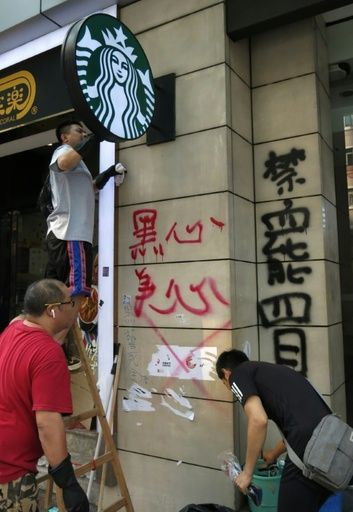Starbucks Faces An Escalating Crisis In Hong Kong

Starbucks' (NASDAQ:SBUX) stores in Hong Kong were recently burned and vandalized amid the escalating protests and riots across the city. The protesters justified the attacks by claiming that Maxim's Group, which owns Starbucks' licenses in Hong Kong and Macao, supports Beijing and opposes the protests.
The attacks started after Annie Wu, the daughter of Maxim's founder, spoke out against the protests during the UN Human Rights Council meeting in mid-September. Speaking to CGTN (the overseas arm of China's state-backed CCTV), Wu called the protests "riots" and expressed hope that the Hong Kong police force would "maintain law and order."
Speaking to Fortune, an anonymous protester claimed that his peers would "go after all of Maxim's companies" in retaliation for Wu's comments. Let's discuss how this escalating crisis affects Starbucks, and why the coffee giant is stuck between a rock and a hard place.
How much does Hong Kong matter to Starbucks?
Starbucks ended last quarter with 30,626 company-owned and licensed stores. Of those, 9,246 were located in the China/Asia-Pacific region.
Within that total, 3,922 stores were in China, and about 200 of those locations are licensed to Maxim's in Hong Kong and Macao -- roughly double the number of locations as its closest regional rival, Pacific Coffee. As of last year, 174 of those stores were in Hong Kong. This means that Hong Kong accounts for 4% of Starbucks' stores in China and 2% of all its Asian stores.
Those percentages seem low, but they're meaningful because a complete shutdown of Starbucks stores across Hong Kong would dent its Chinese comps, which improved 6% last quarter. Starbucks' total revenue in China -- lifted by a 16% increase in stores -- rose 10% annually to $728.8 million, or 11% of its top line.
Starbucks' total China/Asia-Pacific comps and revenue rose 5% and 9%, respectively. That makes the region Starbucks' second-fastest-growing market after the Americas, which posted 7% comps growth and 11% revenue growth last quarter.
During last quarter's conference call, Starbucks CEO Kevin Johnson noted that China "performed extremely well" and that the company remains "bullish on the long-term market opportunity" in the Middle Kingdom. Johnson also highlighted its delivery partnership with Alibaba as "an important driver" to its digital growth in the country.
The Maxim's crisis in Hong Kong could impact other markets
Starbucks doesn't regularly disclose its store count or revenue in Hong Kong, but the known figures indicate that the abrupt loss of Hong Kong could take a big bite out of its Chinese revenue.
Starbucks partnered with Maxim's back in 2000 in Hong Kong and Macao, and subsequently expanded that partnership to Cambodia, Vietnam, and Singapore. Therefore, it's unlikely that Starbucks can simply withdraw its licenses from Maxim's without severely disrupting those other markets.
Moreover, cutting ties with Maxim could be interpreted as an anti-China move and spark a backlash across mainland China, which could be far worse than a temporary shutdown of its Hong Kong stores. But that would be great news for Luckin Coffee, the second-largest coffee chain in China, which is aiming to top Starbucks' store count by the end of the year.
In short, Starbucks is stuck between a rock and a hard place, and it needs to choose its next words and moves very carefully.
The key takeaways
Starbucks isn't the only U.S. brand that is partnered with Maxim's -- its other prominent partners include Shake Shack and The Cheesecake Factory.
Yet Starbucks' Hong Kong stores were attacked more frequently than Shake Shack or Cheesecake Factory's locations for three simple reasons: Starbucks has more stores, its partnership with Maxim's is more well known, and it's known for taking positions on social issues like the Ferguson riots and gun control in the past.
However, Starbucks rarely expresses opinions about overseas social issues, and it's naive for protesters to expect the coffee giant to cut ties with longtime partner Maxim's, anger its customers in China, and disrupt its operations across other Asian markets.
For now, the best move for Starbucks is to stay quiet, try to keep operating its stores in more peaceful regions of Hong Kong, and wait out the storm. Investors should brace for a hit to its Chinese comps this quarter, but the damage should only be temporary if it sticks with Maxim's and keeps its head down.
This article originally appeared in the Motley Fool.
Leo Sun has no position in any of the stocks mentioned. The Motley Fool owns shares of and recommends Starbucks. The Motley Fool has a disclosure policy.




















